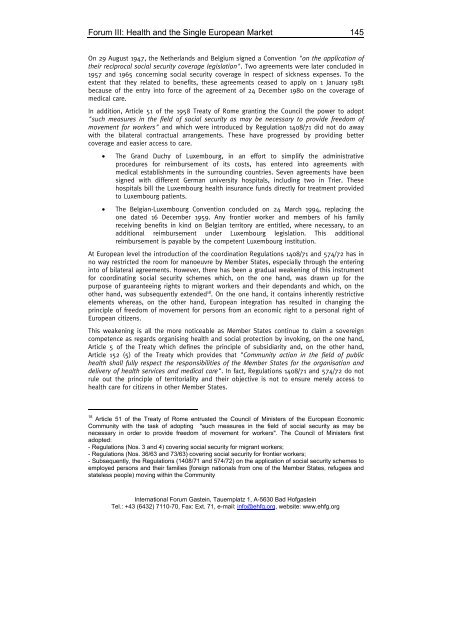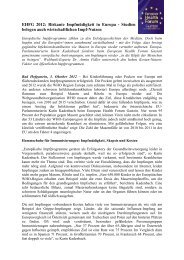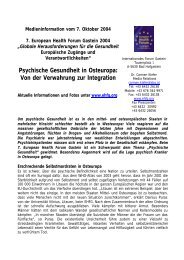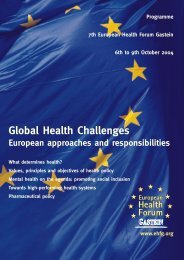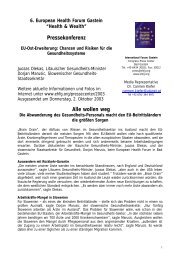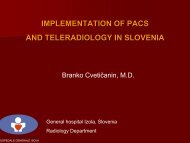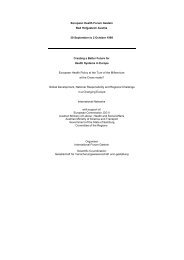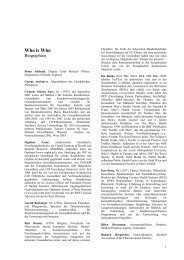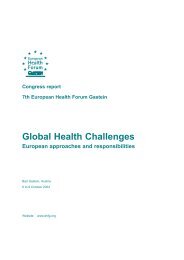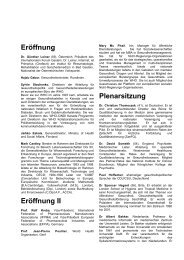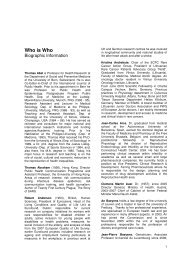Congress report - European Health Forum Gastein
Congress report - European Health Forum Gastein
Congress report - European Health Forum Gastein
Create successful ePaper yourself
Turn your PDF publications into a flip-book with our unique Google optimized e-Paper software.
<strong>Forum</strong> III: <strong>Health</strong> and the Single <strong>European</strong> Market<br />
On 29 August 1947, the Netherlands and Belgium signed a Convention "on the application of<br />
their reciprocal social security coverage legislation". Two agreements were later concluded in<br />
1957 and 1965 concerning social security coverage in respect of sickness expenses. To the<br />
extent that they related to benefits, these agreements ceased to apply on 1 January 1981<br />
because of the entry into force of the agreement of 24 December 1980 on the coverage of<br />
medical care.<br />
In addition, Article 51 of the 1958 Treaty of Rome granting the Council the power to adopt<br />
"such measures in the field of social security as may be necessary to provide freedom of<br />
movement for workers" and which were introduced by Regulation 1408/71 did not do away<br />
with the bilateral contractual arrangements. These have progressed by providing better<br />
coverage and easier access to care.<br />
International <strong>Forum</strong> <strong>Gastein</strong>, Tauernplatz 1, A-5630 Bad Hofgastein<br />
Tel.: +43 (6432) 7110-70, Fax: Ext. 71, e-mail: info@ehfg.org, website: www.ehfg.org<br />
145<br />
• The Grand Duchy of Luxembourg, in an effort to simplify the administrative<br />
procedures for reimbursement of its costs, has entered into agreements with<br />
medical establishments in the surrounding countries. Seven agreements have been<br />
signed with different German university hospitals, including two in Trier. These<br />
hospitals bill the Luxembourg health insurance funds directly for treatment provided<br />
to Luxembourg patients.<br />
• The Belgian-Luxembourg Convention concluded on 24 March 1994, replacing the<br />
one dated 16 December 1959. Any frontier worker and members of his family<br />
receiving benefits in kind on Belgian territory are entitled, where necessary, to an<br />
additional reimbursement under Luxembourg legislation. This additional<br />
reimbursement is payable by the competent Luxembourg institution.<br />
At <strong>European</strong> level the introduction of the coordination Regulations 1408/71 and 574/72 has in<br />
no way restricted the room for manoeuvre by Member States, especially through the entering<br />
into of bilateral agreements. However, there has been a gradual weakening of this instrument<br />
for coordinating social security schemes which, on the one hand, was drawn up for the<br />
purpose of guaranteeing rights to migrant workers and their dependants and which, on the<br />
other hand, was subsequently extended18 . On the one hand, it contains inherently restrictive<br />
elements whereas, on the other hand, <strong>European</strong> integration has resulted in changing the<br />
principle of freedom of movement for persons from an economic right to a personal right of<br />
<strong>European</strong> citizens.<br />
This weakening is all the more noticeable as Member States continue to claim a sovereign<br />
competence as regards organising health and social protection by invoking, on the one hand,<br />
Article 5 of the Treaty which defines the principle of subsidiarity and, on the other hand,<br />
Article 152 (5) of the Treaty which provides that "Community action in the field of public<br />
health shall fully respect the responsibilities of the Member States for the organisation and<br />
delivery of health services and medical care". In fact, Regulations 1408/71 and 574/72 do not<br />
rule out the principle of territoriality and their objective is not to ensure merely access to<br />
health care for citizens in other Member States.<br />
18 Article 51 of the Treaty of Rome entrusted the Council of Ministers of the <strong>European</strong> Economic<br />
Community with the task of adopting "such measures in the field of social security as may be<br />
necessary in order to provide freedom of movement for workers". The Council of Ministers first<br />
adopted:<br />
- Regulations (Nos. 3 and 4) covering social security for migrant workers;<br />
- Regulations (Nos. 36/63 and 73/63) covering social security for frontier workers;<br />
- Subsequently, the Regulations (1408/71 and 574/72) on the application of social security schemes to<br />
employed persons and their families [foreign nationals from one of the Member States, refugees and<br />
stateless people) moving within the Community


